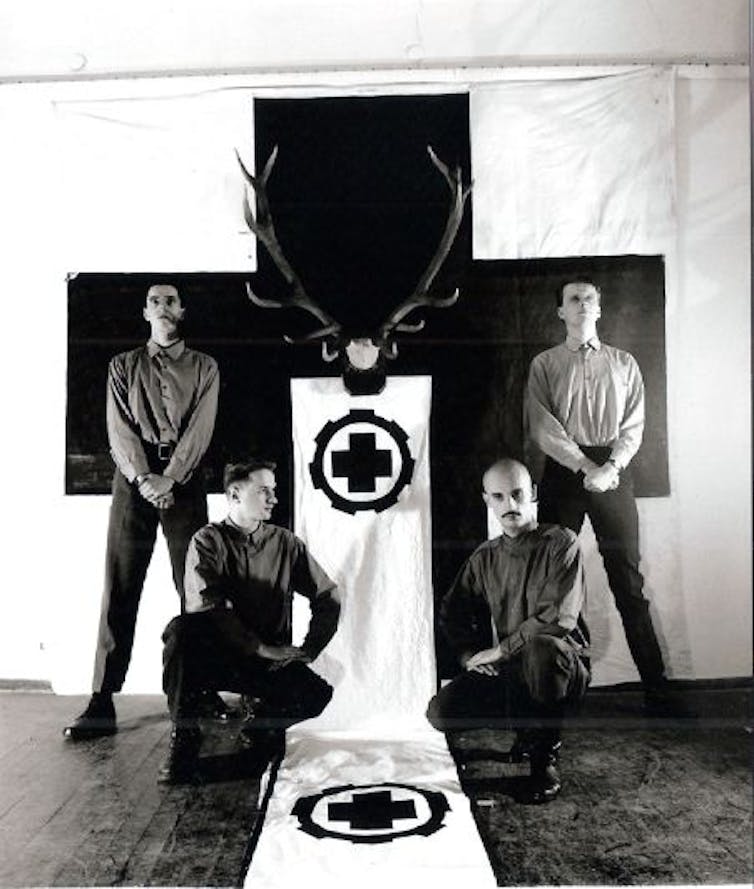40 years of Laibach – is this Slovenian avant-garde band the most controversial in rock history?
- Written by Andrew Dawson, Professor and Chair of Anthropology, University of Melbourne
June, 1980, Laibach was formed. Soon, they became the musical wing of the Slovenian arts collective Neue Slowenische Kunst (NSK), or New Slovenian Art. Comprising visual artists, theatre companies and a unit dedicated to social theory, NSK was concerned with exploring the relationships between art and politics.
Laibach took its name from Austro-Hungarian and then Nazi occupied Ljubliana, the capital city of Slovenia. They were the first Western band to perform in North Korea and their most recent album is a cover of the Sound of Music, which re-presents that most saccharine of musicals as an exercise in the celebration of Austrian fascism and paedophilia.
Laibach is one of the most controversial, innovative and truly strange bands in rock history.
Exile
Cultural provocateurs par excellence, Laibach has managed to offend all points in the political spectrum.
Its earliest concerts were performed against a backdrop of images of “Tito”, the revered former leader of the then in-decline Socialist Federal Republic of Yugoslavia (SFRY), next to a drooping penis.
In a strategy that lent the appearance of tolerance while in fact inviting public retribution, the state invited Laibach to explain its actions on prime-time TV. The band appeared in military garb and gave an interview of totalitarian-esque slogans.
Laibach was promptly declared a fascist organisation by state officials, a descriptor thrust on anyone the state disagreed with.
In response, Laibach revealed its members were dressed in their Yugoslav army conscript uniforms, their words a mash-up of SFRY propaganda. The state banned Laibach from performing, and its members were forced into exile.
Laibach similarly raised the ire of the very ethnonationalist forces that brought down the SFRY. In 1984, they covered Live is Life, by Austrian Europop band Opus. In Laibach’s video, stags and majestic landscapes – symbols of romantic nationalism – are combined with symbols of Nazism and militarism, reminding Slovenian viewers of an uncomfortable public secret: the rural peasantry, who embody Slovenian nationalism most, were also willing collaborators in the violent Germanisation of the country in World War II.
Rehabilitation and the totalitarian cure
After many pariah years, Laibach came to be rehabilitated. In 2017, the philosopher Slavoj Žižek wrote an article titled “Why are Laibach and NSK not fascists”. Žižek had critiqued liberal and leftists alike for their condemnation of Laibach’s use of fascist and other totalitarian symbolism. There was nothing at all ironic in Laibach’s actions, he argued. Rather, Laibach sought to promote an over-identification with such symbolism and it was through this that identification with fascism could be overcome.
Laibach’s recordings are now regarded widely as key examples of Soviet postmodernism, exploring relationships between ideology and art. Laibach demonstrates how apparently benign musical forms conceal repressed totalitarian sentiments by transforming the musical arrangement of famous pop songs into martial anthems. The Beatles’ Get Back was written as a song about homecoming; in Laibach’s hands it is a warning to immigrants to keep out.
Read more: First foreign band to play North Korea is famed for its 'fascism'
Laibach’s live performances are even more affecting, using the discordant sounds of martial music, feedback, recordings of political speeches and barking dogs,described by the band as “ritualised demonstrations of political force”. Within each show the audience goes through a full circle of alienation by identification with, and dis-identification from, totalitarianism.
Not surprisingly, Laibach has cemented its status as a darling of the leftist avant-garde. Nowadays, they are just as likely to be found performing at the Tate Modern, the Venice Biennale, MONA or with philharmonic orchestras as in sweaty rock venues.
Eternal Laibach
With typical bombast, NSK once declared “only God can subdue LAIBACH. People and things never can.” Laibach has gone about making itself eternal.
Mimicking the totalitarian state, NSK eschews individualism. Its manifesto states “each individual is subjugated to the whole.” Indeed, when the original lead singer Tomaž Hostnik died by suicide, he was was posthumously thrown out of the band for undertaking an act that was not collectively sanctioned.
More recently, Laibach’s anti-individualism has manifested in core members relegating themselves to tech roles like lighting engineers, with the musicians replaced by younger artists who will outlive them. In 1991, NSK declared itself a virtual non-territorial state, with some displaced people unsuccessfully trying to use NSK passports at actual border crossings.
 Laibach photographed in 1983.
Laibach/Wikimedia Commons, CC BY-SA
Laibach photographed in 1983.
Laibach/Wikimedia Commons, CC BY-SA
The Slovenian state now cherishes Laibach as a national icon. Children march into school assemblies to the accompaniment of a Laibach song, and rumours abound the Slovenian state is striving to have Laibach classified by UNESCO as an intangible site of World Heritage.
Laibach’s method for longevity contrasts sharply with the narcissistic cult of personality approach deployed by its main cultural colleagues: totalitarian political leaders and pop stars. The SFRY was unable to survive the death of its charismatic leader Tito. Despite frantic attempts on social media, pop stars will disappear as quickly as they shoot to fame. Perhaps the key lesson to learn from Laibach is the best way to remain a star is to go out of your way to not be one.
Happy birthday Laibach! It is likely to be just one of many more to come.
Authors: Andrew Dawson, Professor and Chair of Anthropology, University of Melbourne





